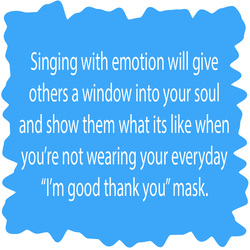|
Photo courtesy of covershut.com 'The best and most beautiful things in the world cannot be seen or even touched. They must be felt with the heart' ~ Helen Keller  Good singers are a dime a dozen, what makes a GREAT singer is their ability to sing with emotion and bring out the dynamics in a song. Singing with emotion, connects you with your audience in a very real way. They have let the audience into their world and through their voice they give the audience a glimpse into their heart and soul. Have you ever listened to a singer and felt ‘inspired’, ‘sad’, ‘angry’ or ‘happy’? And how can you bring this into your singing? Well, I’ll give you some tips to help you incorporate this into your singing. It’s not as easy as it sounds but it is possible as long as you are willing to give it a go. The easiest way to experience this, is to try using emotion in your singing with a song you have connected with already. In other words, you’ve experienced the exact same scenario as sung in that song. This is by far the easiest way to connect with a song by reliving that experience in your mind and producing that feeling into the song. Not all songs are that easy though, so my advice for you is to pick out the main emotions and feeling of the song and find something similar in your experience to help connect you with the song’s emotion. Relive it, not only in your singing but with your entire body. If it is a sad song for instance, think about how you feel when you’re feeling sad? Think of your facial expressions, think of your posture, think about the icky feeling in your chest. Then recreate it physically as well as emotionally and produce that feeling through the song. A simple exercise to practice this method of emotional singing without using songs is to re-create different emotions and just use the vowels, AY, EE, AH, OH and OO. Find a comfortable place, take a moment to recreate an emotion with your entire being, then sing one of the vowels. Sing it at the pitch and tone you want to use to create that emotion, notice how you feel while you are singing with this emotion, do you feel it within your whole body. Move around the room, try different postures and facial expressions to match the emotion. Have some fun with it! Then take a moment or two to observe how it felt afterwards. IMPORTANT NOTE: Do not force the sound. Learn to balance your voice at lower levels, and then as you master your voice at a quieter level you can send a little more air pressure through, your voice will stay balanced and open, while projecting a little further. Being able to sing loud and powerfully is a matter of becoming an expert of your voice at the lower and medium volumes, then bit by bit increase the intensity without forcing it to happen and straining your vocal chords and ending up with a sore throat. Most of all, keep it fun! When it becomes hard work we feel disheartened and then we don’t get anywhere so if you find yourself ‘thinking’ too much about it, am I doing it right or wrong. Take a breather or just sing something light and easy that you really enjoy without thinking about how you are singing it. Then revisit it. I recently read in great little book called, The Inner Game of Music that: “People ‘play’ sports and people ‘play’ music, yet both involve hard work and discipline. Both are forms of self-expression which require a balance of spontaneity and structure, technique and inspiration. Both demand a degree of mastery over the human body, and yield immediately apparent results which can give timely feedback to the performer.” So as much as you need to work on your technique, your breathing and the phrasing - it is just as important if not MORE important that you make it enjoyable and fun. We all learn faster, if we love what we are doing. Thank you for taking the time to read this blog, I hope you found this free resource valuable. I look forward to hearing what you have to say about it. Please leave your questions and comments below and I will happily answer them. Sarah Morrison
1 Comment
|

 RSS Feed
RSS Feed

